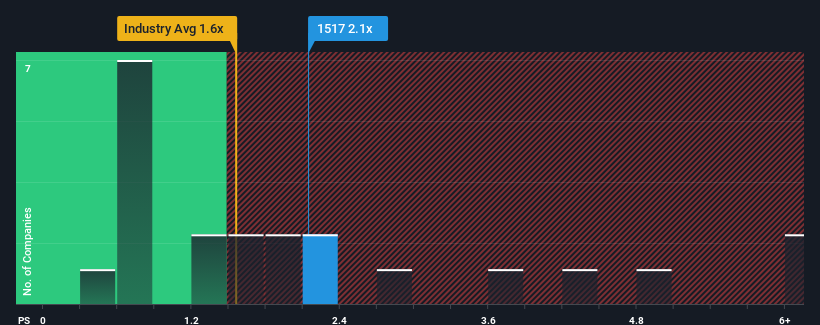Some Shareholders Feeling Restless Over Lee Chi Enterprises Company Ltd.'s (TWSE:1517) P/S Ratio

Lee Chi Enterprises Company Ltd.'s (TWSE:1517) price-to-sales (or "P/S") ratio of 2.1x may not look like an appealing investment opportunity when you consider close to half the companies in the Leisure industry in Taiwan have P/S ratios below 1.6x. However, the P/S might be high for a reason and it requires further investigation to determine if it's justified.
See our latest analysis for Lee Chi Enterprises

What Does Lee Chi Enterprises' P/S Mean For Shareholders?
For example, consider that Lee Chi Enterprises' financial performance has been poor lately as its revenue has been in decline. One possibility is that the P/S is high because investors think the company will still do enough to outperform the broader industry in the near future. However, if this isn't the case, investors might get caught out paying too much for the stock.
Want the full picture on earnings, revenue and cash flow for the company? Then our free report on Lee Chi Enterprises will help you shine a light on its historical performance.Is There Enough Revenue Growth Forecasted For Lee Chi Enterprises?
Lee Chi Enterprises' P/S ratio would be typical for a company that's expected to deliver solid growth, and importantly, perform better than the industry.
Retrospectively, the last year delivered a frustrating 63% decrease to the company's top line. As a result, revenue from three years ago have also fallen 57% overall. Accordingly, shareholders would have felt downbeat about the medium-term rates of revenue growth.
Comparing that to the industry, which is predicted to deliver 16% growth in the next 12 months, the company's downward momentum based on recent medium-term revenue results is a sobering picture.
With this information, we find it concerning that Lee Chi Enterprises is trading at a P/S higher than the industry. It seems most investors are ignoring the recent poor growth rate and are hoping for a turnaround in the company's business prospects. Only the boldest would assume these prices are sustainable as a continuation of recent revenue trends is likely to weigh heavily on the share price eventually.
The Key Takeaway
We'd say the price-to-sales ratio's power isn't primarily as a valuation instrument but rather to gauge current investor sentiment and future expectations.
We've established that Lee Chi Enterprises currently trades on a much higher than expected P/S since its recent revenues have been in decline over the medium-term. When we see revenue heading backwards and underperforming the industry forecasts, we feel the possibility of the share price declining is very real, bringing the P/S back into the realm of reasonability. Unless the the circumstances surrounding the recent medium-term improve, it wouldn't be wrong to expect a a difficult period ahead for the company's shareholders.
A lot of potential risks can sit within a company's balance sheet. Our free balance sheet analysis for Lee Chi Enterprises with six simple checks will allow you to discover any risks that could be an issue.
If these risks are making you reconsider your opinion on Lee Chi Enterprises, explore our interactive list of high quality stocks to get an idea of what else is out there.
New: AI Stock Screener & Alerts
Our new AI Stock Screener scans the market every day to uncover opportunities.
• Dividend Powerhouses (3%+ Yield)
• Undervalued Small Caps with Insider Buying
• High growth Tech and AI Companies
Or build your own from over 50 metrics.
Have feedback on this article? Concerned about the content? Get in touch with us directly. Alternatively, email editorial-team (at) simplywallst.com.
This article by Simply Wall St is general in nature. We provide commentary based on historical data and analyst forecasts only using an unbiased methodology and our articles are not intended to be financial advice. It does not constitute a recommendation to buy or sell any stock, and does not take account of your objectives, or your financial situation. We aim to bring you long-term focused analysis driven by fundamental data. Note that our analysis may not factor in the latest price-sensitive company announcements or qualitative material. Simply Wall St has no position in any stocks mentioned.
About TWSE:1517
Flawless balance sheet very low.
Market Insights
Community Narratives



